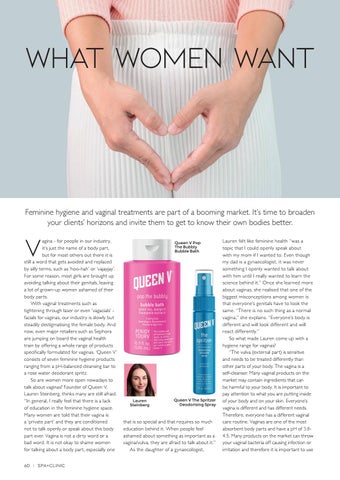What Women Want
Feminine hygiene and vaginal treatments are part of a booming market. It’s time to broaden your clients’ horizons and invite them to get to know their own bodies better.
V
agina - for people in our industry, it’s just the name of a body part, but for most others out there it is still a word that gets avoided and replaced by silly terms, such as ‘hoo-hah’ or ‘vajayjay’. For some reason, most girls are brought up avoiding talking about their genitals, leaving a lot of grown-up women ashamed of their body parts. With vaginal treatments such as tightening through laser or even ‘vagacials’ facials for vaginas, our industry is slowly but steadily destigmatising the female body. And now, even major retailers such as Sephora are jumping on board the vaginal health train by offering a whole range of products specifically formulated for vaginas. ‘Queen V’ consists of seven feminine hygiene products ranging from a pH-balanced cleansing bar to a rose water deodorant spritz. So are women more open nowadays to talk about vaginas? Founder of Queen V, Lauren Steinberg, thinks many are still afraid. “In general, I really feel that there is a lack of education in the feminine hygiene space. Many women are told that their vagina is a ‘private part’ and they are conditioned not to talk openly or speak about this body part ever. Vagina is not a dirty word or a bad word. It is not okay to shame women for talking about a body part, especially one 60 | SPA+CLINIC
Queen V Pop The Bubbly Bubble Bath
Lauren Steinberg
Queen V The Spritzer Deodorising Spray
that is so special and that requires so much education behind it. When people feel ashamed about something as important as a vagina/vulva, they are afraid to talk about it.” As the daughter of a gynaecologist,
Lauren felt like feminine health “was a topic that I could openly speak about with my mom if I wanted to. Even though my dad is a gynaecologist, it was never something I openly wanted to talk about with him until I really wanted to learn the science behind it.” Once she learned more about vaginas, she realised that one of the biggest misconceptions among women is that everyone’s genitals have to look the same. “There is no such thing as a normal vagina,” she explains. “Everyone’s body is different and will look different and will react differently.” So what made Lauren come up with a hygiene range for vaginas? “The vulva (external part) is sensitive and needs to be treated differently than other parts of your body. The vagina is a self-cleanser. Many vaginal products on the market may contain ingredients that can be harmful to your body. It is important to pay attention to what you are putting inside of your body and on your skin. Everyone’s vagina is different and has different needs. Therefore, everyone has a different vaginal care routine. Vaginas are one of the most absorbent body parts and have a pH of 3.84.5. Many products on the market can throw your vaginal bacteria off causing infection or irritation and therefore it is important to use
